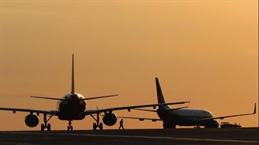
The move follows Pakistan's April 24 decision to block Indian airlines from its airspace after a deadly attack in Indian-controlled Kashmir that killed 26 people.
The restriction, in effect until May 23, applies to all Pakistani-registered, operated, or leased aircraft, including commercial and military flights and will prompt Pakistani airlines to reroute flights through alternative paths, such as China or Sri Lanka, to reach Southeast Asia.
India's airspace closure, combined with Pakistan's ban on Indian carriers, has disrupted international flight routes and air cargo operations, particularly affecting flights to North America, the UK, Europe, and the Middle East.
While most Indian exports are transported by sea, air cargo shipments — especially perishables, electronics, and high-value goods — are experiencing delays and increased costs as airlines adjust their cargo loads to accommodate extra fuel for longer routes, which reduces available space for shipments.
Pakistan's airspace is a critical corridor for westbound routes from northern India, and the ban has reportedly forced Air India, among others, to use longer and costlier alternative routes, affecting schedules and operational efficiency.
Flights from India to Europe, North America, and the Middle East are now taking 15 minutes to 1.5 hours longer, depending on the destination. Some flights also require technical stops for refuelling, adding further delays.
Air India flights to the US, UK and Europe are rerouting over the Arabian Sea, increasing fuel costs and reducing cargo capacity; IndiGo routes to Central Asia, including Almaty and Tashkent, have been cancelled due to operational range limitations; and SpiceJet & Akasa Air are both facing schedule disruptions but continuing operations with adjusted flight paths.
The extended flight times and rerouting are expected to raise operational costs for Indian airlines by US$10–US15 million if the restrictions persist for a month, according to estimates by Linus Bauer, founder and managing director of UAE-based consultancy BAA & Partners.
Meanwhile, the impact of the ban on Pakistan's airline industry is expected to be smaller since only Pakistan International Airlines operates routes to Kuala Lumpur using Indian airspace.
Pakistan's Prime Minister Shehbaz Sharif has already denied any involvement in the Kashmir attack and has called for an independent investigation. India, on the other hand, has escalated measures against its neighbour, including suspending the Indus Waters Treaty and revoking visas for Pakistani nationals.



